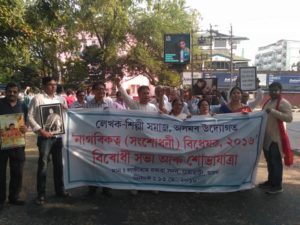Decoding politics of Citizenship Amendment Bill
The religious subjugation can be ground for differentiation, it cannot be articulated, which weakens the republican and secular basics of citizenship in India and constitutional morality.
T

he Citizenship Amendment Bill 2016 categorises Hindus, Jains, Parsis, Sikhs, Buddhist and Christians from Afghanistan, Pakistan and Bangladesh, as omissions to the law prevailing access to citizenship in India and the definition of foreigners by creating distinct provisions on the grounds of religion. It specifically identified religion as a new idea into the citizenship law, which is unprecedented in nature.
The Bill being considered by a Joint Parliamentary Committee, is the sixth amendment to the Citizenship Act of India, 1955. Previous amendments had grounds of jus sanguini (blood and descent) over jus soli (soil or birth) by limiting citizenship by birth, and making descent/Indian origin the source.
Allowing citizenship to Hindu refugees and making India a natural home for ill-treated Hindus were among the assurances made during 2014 Lok Sabha election manifesto by BJP. During election they also guaranteed citizenship to Hindu-Bangladeshis and promised that they would be removed from the migrant camps. A nearer appearance at the provisions of the act specifies that the current government is attempting to increase its voter count. This can change the voter demographics in the country and border areas would face a flood of selected minority especially Hindu migrants. The religious subjugation can be ground for differentiation, it cannot be articulated, which weakens the republican and secular basics of citizenship in India and constitutional morality. And if government motivated only by humanitarian concern towards sufferers of religious discrimination, it would not exclude Rohingya Muslims who were forced to flee Myanmar and pleading for asylum ever since 2015.
 The objective of the Bill to address the difficulty of ill-treated people looks positive, but begs the question of why the Ahmadiyyas, Uyghurs and Uighur Muslims from China have been unnoticed. Neighbouring Sri Lankan Tamils have been excluded from the realm which may raise questions like whether their inclusion would be more suited to the interests of regional parties, such as the AIADMK and the DMK than BJP, Myanmar’s Hindus have also been unheeded in the Bill. After opposition government commissioned a Joint Parliamentary Committee and attempted to clarify allegations of religious discrimination, they had a discussion over changing of the term “religious minorities” to “discriminated religious minorities.”
The objective of the Bill to address the difficulty of ill-treated people looks positive, but begs the question of why the Ahmadiyyas, Uyghurs and Uighur Muslims from China have been unnoticed. Neighbouring Sri Lankan Tamils have been excluded from the realm which may raise questions like whether their inclusion would be more suited to the interests of regional parties, such as the AIADMK and the DMK than BJP, Myanmar’s Hindus have also been unheeded in the Bill. After opposition government commissioned a Joint Parliamentary Committee and attempted to clarify allegations of religious discrimination, they had a discussion over changing of the term “religious minorities” to “discriminated religious minorities.”
The Bill is also in conflict with India’s refugee policy. India does not have a categorised policy for refugees, but at the time of Tibetan refugee crisis, one of the conditions was that they have to return to their homeland once normalcy prevailed. The proposed amendment is in direct contradiction to this as it provides citizenship rights to such refugees and hugely relaxes the procedure for citizenship. Moreover, it also confuses ‘Refugees’ with ‘Migrants’ and overlooks this important distinction by terming people from religious minorities as migrants instead of refugees.
The ill-fated trend that has emerged is that be it any party in power, the citizenship laws have always been used by them to mollify and combine their own respective vote banks.
T he Congress also negotiated the Assam Accord affecting primarily Muslims who were disqualified from obtaining citizenship even after many years. This, in turn, led to the electoral victory of Asom Gana Parishad. To dilute the effect of the Accord, Congress ratified the Illegal Migrant (Determination by Tribunal) Act, 1983, which provided for the detection and expulsion of illegal immigrants from Assam – all the Bangladeshi Muslims. However, in an exercise in appeasement, it was ensured that the procedure provided in the Act and the implementation thereof was such that the expulsions were virtually negligible.
he Congress also negotiated the Assam Accord affecting primarily Muslims who were disqualified from obtaining citizenship even after many years. This, in turn, led to the electoral victory of Asom Gana Parishad. To dilute the effect of the Accord, Congress ratified the Illegal Migrant (Determination by Tribunal) Act, 1983, which provided for the detection and expulsion of illegal immigrants from Assam – all the Bangladeshi Muslims. However, in an exercise in appeasement, it was ensured that the procedure provided in the Act and the implementation thereof was such that the expulsions were virtually negligible.
Giving favor to one community for electoral gains is bad in itself, but excluding others is even worse. It severely hollows the secular socio-legal framework of India. Indian legislature founded the inclusive body of the will of the people after independence. It should have no preferences and try its utmost to deliver justice to all. Although the legislature consists of various political parties with different ideology, but when there is the passing of legislation that bypasses the democratic ideals of India, there should be no politics. This Bill is hurried and vague and in its current stage, might do more harm than good. The debate is not over yet. The Bill is being examined by a Joint Parliamentary Committee. The constitution of such a Committee has been rare in Indian history, constituted only 10 times before this. The government also have the plan to provide opportunities for employment, education, and a better life that these people have been bereft of in their past.
